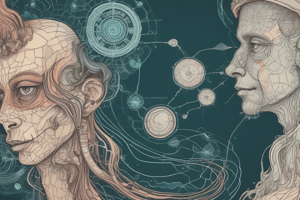Podcast
Questions and Answers
What is the definition of observation in science?
What is the definition of observation in science?
- The act of noticing and describing events or processes in a careful, orderly way (correct)
- A scientific explanation for a set of observations that can be tested
- A logical interpretation based on what scientists already know
- A particular preference or point of view that is personal, rather than scientific
What is the variable that is deliberately changed in an experiment?
What is the variable that is deliberately changed in an experiment?
- Control group
- Independent variable (correct)
- Dependent variable
- Data
What is the study of life called?
What is the study of life called?
- Biology (correct)
- Theory
- Science
- Data
What is the molecule that contains complex information to live, grow, and reproduce?
What is the molecule that contains complex information to live, grow, and reproduce?
What is the term for cells from two parents uniting to form the first cell of a new organism?
What is the term for cells from two parents uniting to form the first cell of a new organism?
What is the term for a single organism producing offspring identical to itself?
What is the term for a single organism producing offspring identical to itself?
What is the term for a well-tested explanation for a range of phenomena?
What is the term for a well-tested explanation for a range of phenomena?
What is the term for a signal to which an organism responds?
What is the term for a signal to which an organism responds?
What is the term for a particular preference or point of view that is personal, rather than scientific?
What is the term for a particular preference or point of view that is personal, rather than scientific?
What is the term for a group in an experiment that is exposed to the same conditions as the experimental group except for one independent variable?
What is the term for a group in an experiment that is exposed to the same conditions as the experimental group except for one independent variable?
Flashcards are hidden until you start studying
Study Notes
Science and the Scientific Method
- Science is an organized way of gathering and analyzing evidence about the natural world.
- Observation involves noticing and describing events or processes in a careful, orderly way.
- Inference is a logical interpretation based on what scientists already know.
- A hypothesis is a scientific explanation for a set of observations that can be tested in ways that support or reject it.
Experiments
- A controlled experiment is an experiment in which only one variable is changed.
- The independent variable is the variable that is deliberately changed (also called the manipulated variable).
- The dependent variable is the variable that is observed and that changes in response to the independent variable (also called the responding variable).
- A control group is a group in an experiment that is exposed to the same conditions as the experimental group except for one independent variable.
Data and Theory
- Data refers to detailed records of experimental observations, gathered information.
- A theory describes a well-tested explanation for a range of phenomena.
Biology and Life Processes
- Biology is the study of life.
- DNA is a genetic code written in a molecule that contains complex information to live, grow, and reproduce and is copied and passed from parent to offspring.
- A stimulus is a signal to which an organism responds.
- There are two types of reproduction: sexual reproduction (cells from two parents unite to form the first cell of a new organism) and asexual reproduction (a single organism produces offspring identical to itself).
Homeostasis and Metabolism
- Homeostasis is the condition in which all organisms need to keep their internal environment relatively stable, even when external conditions change dramatically.
- Metabolism is the combination of chemical reactions through which an organism builds up or breaks down materials.
The Biosphere
- The biosphere is the interconnected network through which all forms of life on Earth are connected, literally meaning "living planet".
Studying That Suits You
Use AI to generate personalized quizzes and flashcards to suit your learning preferences.




